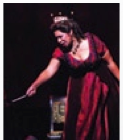Interview | Opera
By Anthony Brancaleone
 Though she was born in the City of Brotherly Love, soprano Mary Elizabeth learned to walk in the City of Lights. Age twenty-five, fresh out of Luther College, in the cornfields of Iowa, Mary Elizabeth moved to France and joined the young artist program at the Opera National de Paris, during what Ms. Williams refers to as “a critical time in my development as a singer.”
Though she was born in the City of Brotherly Love, soprano Mary Elizabeth learned to walk in the City of Lights. Age twenty-five, fresh out of Luther College, in the cornfields of Iowa, Mary Elizabeth moved to France and joined the young artist program at the Opera National de Paris, during what Ms. Williams refers to as “a critical time in my development as a singer.”
It was in those romantic streets, Mary Elizabeth learned to appreciate architecture, learned to eat – “the French spend more money on food than they do things” – and learned to walk, both literally and figuratively.
“Everything we do off the stage effects what we do on the stage,” Ms. Williams points out. “People in Paris walk everywhere. It’s nothing to walk half an hour to see a movie, and they are happier and calmer for it.” Walking to market, absorbing life in all its beauty, becoming fluent in a variety of languages and “being able to flourish in a culture not my own” marked a period of self discovery that must have worked its way up on stage for the Opera singer.
“Every situation allows more colours,” Ms. Williams explains. “And, after two and a half years in Paris, I added a bevy of colour.” But, Mary Elizabeth is quick to mention that life in Iowa was just as important. “Both experiences taught me two different things.”
Mary Elizabeth will perform Tosca at the Michigan Opera Theatre but at the moment she is considering places to eat in Detroit. “I’m horrified with how expensive it is to eat out in this city” she exclaims. But, then she remembers her favourite Thai restaurant, Bankok Crossing, from her last time in town, when she sang Silla in Margaret Garner. “They have very good food and they’re nicely priced” she laughs.
Arriving late from another show in Grand Rapids, Ms. Williams is working hard with the cast, covering the staging of the second Act, rehearsing 11-8, and assures the shortened time will not adversely affect her performance.
“I have no trouble getting into the grove if I have rehearsal and I’m getting that” she says. “The important thing is that I must be prepared to be vulnerable. There is a more immediate connection with the audience when I’m vulnerable. Tosca, I know well, and I have worked with the Director and the tenor, whom I have known since I was nine, so everything should be fine”
Ms. Williams claims to have “resisted Opera as a career for a long time”. An English major, Mary Elizabeth had wanted to parlay her degree into law, en route to becoming a Judge. “I wasn’t convinced Opera was a viable career option,” she explains laughing. “Actually, it’s not, but I’m doing it anyway.”
“The classical arts are a constant battle to lose money as slowly as possible”, continues Ms. Williams..“ Opera has a very difficult time just making back the money it takes to produce the show.”
So, why go through the process of production if it’s such a risky endeavor? “Pure acoustical sounds will make you feel,” offers the Soprano. “It’s an animal reaction between two humans communicating, and that is something one can’t duplicate through recorded music – digital specifically.” A reason as good as any – the Opera is, after all, one of our highest art forms.
“And, what of our stage here in Detroit,” I ask. “Do all theatres offer the same opportunities?”
Mary Elizabeth responds by relating a scene from the movie Hoosiers, where Gene Hackman’s character, the coach of a small high school basketball team, asked one of his players to measure the distance between the boards and the hoop prior to the State Championship game. “It’s the same,” Hackman says. “It’s the same everywhere.”
“Of course, I have no control over the acoustics or the costume,” muses Ms. Williams. “which, can sometimes pose a challenge . . . lest, I throw a Diva fit.”
